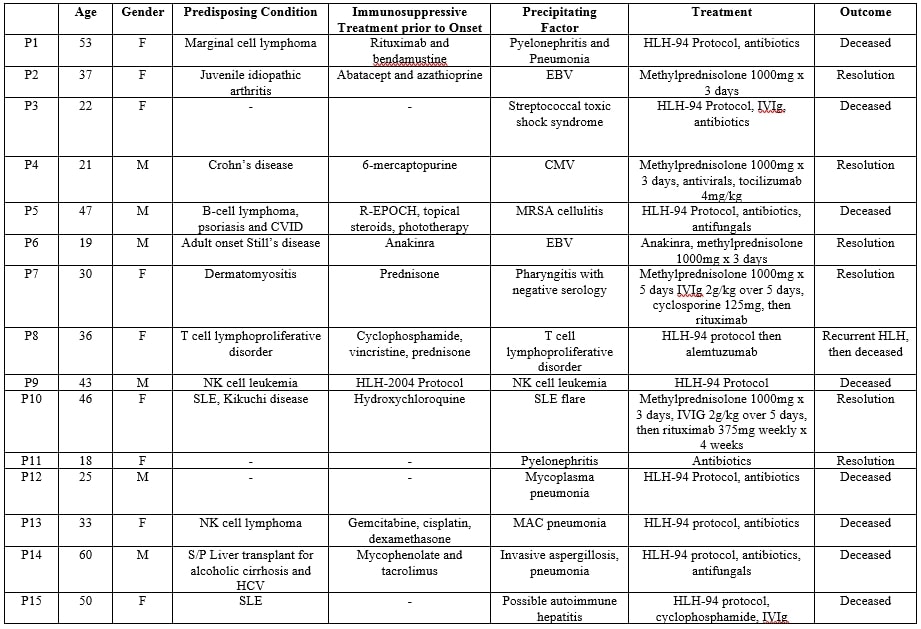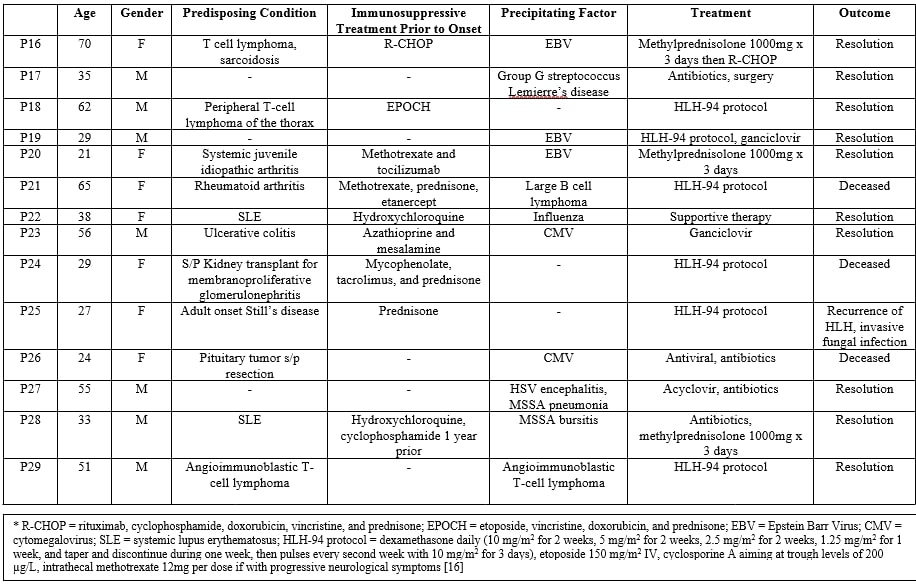Session Information
Date: Monday, November 9, 2020
Title: Miscellaneous Rheumatic & Inflammatory Diseases Poster III: Therapies
Session Type: Poster Session D
Session Time: 9:00AM-11:00AM
Background/Purpose: Hemophagocytic lymphohistiocytosis (HLH) is a rare life-threatening disease characterized by immune-overstimulation and a hyperinflammatory response resulting in cytokine storm and multi-organ failure.1 Secondary HLH usually occurs in adults in the setting of malignancy, infection, or a rheumatic condition. It is often triggered by an infection such as Epstein-Barr virus (EBV).1 Secondary HLH occurring in patients with autoimmune diseases is referred to as macrophage activation syndrome (MAS). The approach to the management of secondary HLH can be confusing and problematic due to the rarity of the condition and the heterogeneity of treatment approaches for HLH. The aim of this study was to study the patients diagnosed with hemophagocytic lymphohistiocytosis at our center, and to compare their predisposing conditions, treatments, and outcomes.
Methods: We conducted a retrospective chart review of all patients over 18 years of age diagnosed with hemophagocytic lymphohistiocytosis at our center between 2013 and 2019. Patients who met HLH-2004 or H-score criteria were included in this study. The patients’ presentations, management, and outcomes were analyzed.
Results: Twenty-nine patients with hemophagocytic lymphohistiocytosis met inclusion criteria. 7 patients had a malignancy, 11 had a rheumatic disease, 6 had an infection alone, 2 were transplant patients, and 3 had a combination of malignancy, rheumatic disease, and/or infection. Of all the patients treated with the HLH-94 protocol 73% (11/15) died, 13% (2/15) had recurrence of HLH, and 6% (1/15) developed an invasive fungal infection. The patients with underlying rheumatologic conditions received targeted personalized therapy with pulse steroids, tocilizumab, anakinra, IVIg, cyclosporin, rituximab and/or cyclophosphamide in addition to antiviral/antibiotic therapy. All of the patients treated with targeted therapy had resolution of HLH.
Conclusion: Our findings suggest that the rheumatologic patient population responds well to a targeted and more personalized therapeutic approach, and poorly to the standard HLH-94 protocol. It is unclear whether the poor outcomes found with the use of the HLH protocol are secondary to the protocol itself, or the aggressive nature of malignancy-associated HLH. HLH is a rare life-threatening disease, and further studies are needed to develop more tailored therapeutic regimens.
 Table 1: Therapeutic Approaches and Outcomes (1/2)
Table 1: Therapeutic Approaches and Outcomes (1/2)
 Table 1: Therapeutic Approaches and Outcomes (2/2)
Table 1: Therapeutic Approaches and Outcomes (2/2)
To cite this abstract in AMA style:
Posas-Mendoza T, McLeod C, Davis W, Quinet R. Etiologies and Management of Hemophagocytic Lymphohistiocytosis: Is It Time for an Updated Protocol and Targeted Treatments? [abstract]. Arthritis Rheumatol. 2020; 72 (suppl 10). https://acrabstracts.org/abstract/etiologies-and-management-of-hemophagocytic-lymphohistiocytosis-is-it-time-for-an-updated-protocol-and-targeted-treatments/. Accessed .« Back to ACR Convergence 2020
ACR Meeting Abstracts - https://acrabstracts.org/abstract/etiologies-and-management-of-hemophagocytic-lymphohistiocytosis-is-it-time-for-an-updated-protocol-and-targeted-treatments/
